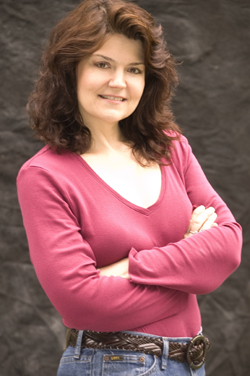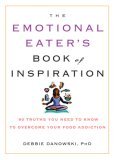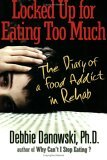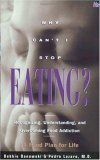 I am very excited to bring you an in-depth interview today with Debbie Danowski, Ph.D., the author of Why Can’t I Stop Eating?
I am very excited to bring you an in-depth interview today with Debbie Danowski, Ph.D., the author of Why Can’t I Stop Eating? and Locked Up for Eating Too Much
, as well as The Overeater’s Journal
, books that I recommended to you in this post.
Her newest book is The Emotional Eater’s Book of Inspiration: 90 Truths You Need to Know to Overcome Your Food Addiction. I haven’t read it yet but based on what I’ve learned from her other books, I would recommend anything to you that Debbie has written about food addiction, especially if you really want to lose weight and have learned through experience that diets just don’t work.
As you already know, I’m addicted to refined sugar as well as some other ingredients. You
know that I’ve been struggling with my sugar addiction lately but am now committed to staying clean and getting fit.
I have to tell you that this interview with Debbie Danowski was a great motivator for me because when I indulge in eating refined sugar and white flour, I am not able to eat only a little and I always crave more and more. It becomes a cycle, which includes emotional eating, and it’s just not healthy for me. I don’t want to have a life that revolves around food, a substance that is meant to be fuel for the body. I am interested in fueling my body with healthy foods, which do not include refined sugar, white flour, added salt, unhealthy fats, or dairy.
Without further ado, please read the following interview with Dr. Debbie Danowski. I hope that this interview can help you if you have tried diet after diet that include refined sugar and flour no matter how small the amounts, and have now become frustrated because they don’t stop the cravings or help you lose weight and keep it off. (I added the emphasis in the following Q&A)
TFS: Hi Debbie, thank you very much for allowing me to interview you today. Your books, Why Can’t I Stop Eating and Locked Up for Eating Too Much are about food addiction and your experience as a food addict. This is a topic that I often write about here at Fearless Fat Loss because I am also a food addict, or more specifically, I am addicted to refined sugars, added salt, unhealthy fats, flour, and even dairy (cheese for certain).
Debbie Danowski: Thank you very much for having me here today.
TFS: I have experienced living without food cravings when I have been free of these substances, however I still seem to be having an issue with denial – even though my life is so much better when I am eating clean and free of addiction. I have allowed myself to think, “one won’t hurt”, which is never true.
Debbie Danowski: That’s right!
TFS: Having once weighed 328 pounds you have successfully recovered (and are recovering) from your food addiction after releasing those addictive foods from your life. You lost 160 pounds and have maintained that loss for over 13 years. (here are Debbie’s before & after weight loss photos)
You began your recovery by admitting yourself to a treatment program for food addiction. Do you believe that other food addicts can successfully get and stay clean of their food addiction without attending a treatment program?
Debbie Danowski: I have been in recovery for over 18 years now. On July 4, 1989 I experienced my first full day of freedom from the overwhelming cravings that dominated my life. Even though I needed to be “locked up” to begin my treatment program, that is not the only way for food addicts to get help. There are support groups (Overeaters Anonymous), weeklong workshops (ACORN Recovery Services), and therapy groups (see your local phone book) that can help food addicts to recover. The main thing to ensure success is for food addicts to take their addictive substances out of their eating plan. If they don’t, they will not be able to recover.
TFS: Besides Overeaters Anonymous (OA), do you have any other suggestions for support groups that food addicts can join?
Debbie Danowski: Oops! I think I answered this above. I would also suggest Food Addicts Anonymous and Grey Sheet meetings if they are available in your area.
TFS: It is such a simple solution to food cravings and overeating – to remove those addictive substances (and for some people this includes food textures) from the diet. Why do you think it is that this solution is not given more “air time” in the media instead of giving that time to the latest diet craze (most of which include addictive food substances), especially since this could effectively solve the “obesity crisis”?
Debbie Danowski: This solution is not given much attention because quite simply people do not want to hear that they need to abstain from sugar and flour. Instead they
want to believe that they can lose weight quickly while still eating whatever they want. This is especially evident when we look at the covers of women’s magazines. In many cases there will be a cover line about a new diet that is near one about baking cookies! In other words, we want to “have our cake and lose weight, too.”
TFS: How have you and do you continue to remain clean and not indulge in your
trigger foods, those food substances that you are addicted to, especially during the major holidays like the Thanksgiving, Christmas, and New Year’s season?
Debbie Danowski: There are several things that help me. The most important is that I
continue to attend support group meetings so that I never forget that it only takes one
to put me back up to 328 pounds. A very dear friend of mine recently passed away. His first “slip” from his program began with food that was on his food plan but more of it. That eventually led to him eating food that wasn’t and ultimately to him weighing almost 600 pounds and dying from complications because of this.
I need to remember things like this and I also need to understand that as a recovering food addict I do not get to have “eat-all-you-want” holidays. I have abused that right for too many years and now I have lost it. I also think about all of the consequences that will happen if I eat foods with sugar and flour. I will not be clear-headed. I will not have energy. I will lose all of my self-respect and this is only the beginning.
TFS: Did you end up needing to develop new friendships after getting clean of your food addiction because your previous friendships revolved around food?
Debbie Danowski: Yes, in some cases I did need to develop new relationships. My entire life was set up to revolve around food, therefore, some of my relationships did as
well. I need to put my food addiction recovery before anything and anyone else in order to keep it. No one and nothing is worth going back to the horrible life that I had before recovery.
TFS: Prior to getting clean, did you have the fear that your life would be boring without sugar, flour, salt, unhealthy fats, all of those addictive yet tasty substances?
Debbie Danowski: Yes, I did but in treatment I was told that if my food is boring that I
needed to look at my life. Food is meant to nourish my body not provide excitement or make me feel good. I can do other things in my life to avoid feeling bored.
TFS: What do you believe is the number one problem or issue that stops people
from accepting that they are food addicts?
Debbie Danowski: The fear of how painful recovery will be. I honestly don’t believe that anyone wants to binge until they feel sick. I think that people are afraid that recovery will be too much work or bring up too many unpleasant feelings. And while this may be the case sometimes, there are also so many benefits that people who haven’t experienced recovery cannot even imagine. I did not know that it was possible to go through ten minutes without obsessing about food, never mind days and years. It is an absolutely incredible feeling but until I experienced it myself I did not know how wonderful it could be.
TFS: What is your take on artificial sweeteners? Do they have a positive place in the life of a recovering food addict, or do you recommend using only Stevia?
Debbie Danowski: Artificial sweeteners are okay but in limited quantities – no more than 6 packets a day. I use Sweet-N-Low because I know that it does not cause cravings. When I began my food plan Stevia was not available. It will be different for everyone and it will take honesty to find out what works.
TFS: What percentage of the human population do you believe are addicted to food
substances, especially to refined sugar?
Debbie Danowski: This is a tough one because there is no way to measure this since many people who are addicted to food are not aware of it themselves. My guess is that with more than 65% of the population being overweight that a good majority of them are addicted to food either physically and/or emotionally.
TFS: Besides picking up a copy of your books (which I highly recommend), what is the one piece of advice that you could give to a food addict who wants to get started with their own recovery and live a life free of food addiction?
Debbie Danowski: Thanks for the kind words about my books. I would recommend attending an OA meeting, reaching out for therapy, going to a workshop or anything else that connects that person with recovery in some way. It is impossible to recover from food addiction alone. If you want recovery, you must reach out and ask for help.
TFS: Thank you very much Debbie. I appreciate your time and am honored to have had the opportunity to interview you today. Thank you for sharing so much of yourself and your experiences with food addiction, not only in this interview but also in the books you have written to help other food addicts recover and gain a life of freedom from food cravings, overeating, and overweight.
Debbie Danowski: Thank you for helping to bring awareness to the disease of food addiction.





